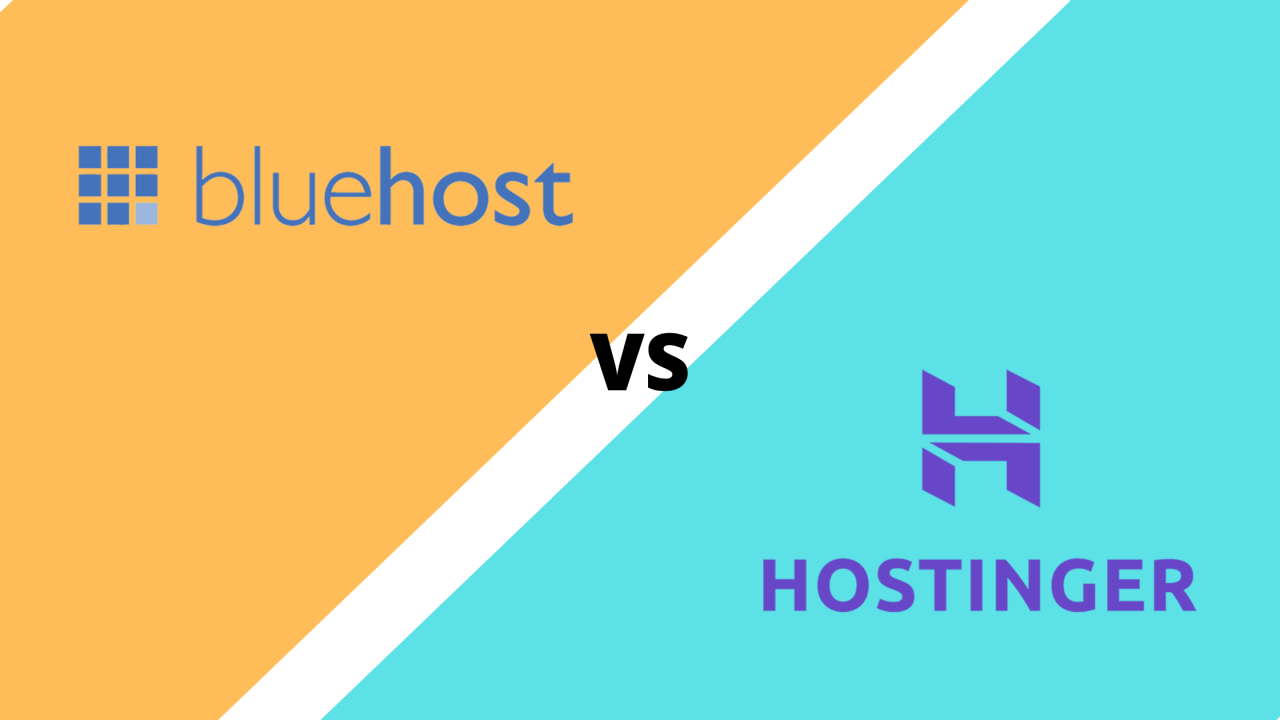
Are you in search of a candid web hosting comparison between Hostinger vs Bluehost?
Both Hostinger and Bluehost stand out as two of the most budget-friendly hosting providers available. However, beginners frequently grapple with choosing between the two for their websites.
In this comprehensive guide, we'll conduct a thorough comparison of Hostinger vs. Bluehost, highlighting their respective pros and cons to help you make an informed decision.
What is Hostinger?

Hostinger is a renowned global web hosting provider, celebrated for its cost-effective and user-friendly services.
The company presents a variety of hosting options at competitive rates, encompassing shared, VPS, cloud, and WordPress hosting.
Every Hostinger plan incorporates complimentary SSL certificates, backups, built-in caching, and an array of other features.
Catering to a broad spectrum of users, from novices to seasoned clients, Hostinger delivers dependable and budget-friendly hosting solutions.
Furthermore, Hostinger extends domain registration services and offers an uncomplicated website builder.
Pros of Hostinger
Affordable Plans: Hostinger offers extremely low-cost hosting plans, making it an excellent choice for individuals looking to test out an idea or launch a small website without breaking the bank.
Excellent Performance: Despite its low price point, Hostinger delivers impressive performance and speed, exceeding expectations for budget-friendly hosting.
Excellent Customer Support: Hostinger provides top-notch customer support across all its hosting plans, making it particularly appealing to beginners seeking assistance.
Cons of Hostinger
Plan Limitations: To maintain affordability, Hostinger imposes limitations on entry-level and lower-tier hosting plans. However, as your website grows, you can overcome these limitations by upgrading to more advanced cloud or VPS plans.
No Daily Backups: Hostinger's single and premium plans offer weekly backups rather than daily backups. While this may be seen as a drawback, we recommend users set up their own backup solution for added security.
What is Bluehost?

Bluehost, established in 2003, is a renowned web hosting company known for its diverse range of hosting services tailored to meet the needs of users at all levels, from beginners to advanced webmasters.
Bluehost stands out for its exceptional WordPress hosting, distinguished as one of the select hosting providers officially recommended by WordPress.org.
Moreover, Bluehost is celebrated for its user-friendly interface, simplifying website management for individuals without technical expertise. The company commonly provides a complimentary domain name for the initial year, SSL certificates, and round-the-clock customer support in its hosting plans.
Pros of Bluehost
Low Costs: Bluehost's most affordable plan allows you to kickstart your website at a low price, offering excellent value for new small businesses, bloggers, portfolios, and other WordPress websites.
Ease of Use: Bluehost boasts one of the most user-friendly hosting control panels, simplifying the process of installing WordPress with one click and managing your website effortlessly.
Free Domain: Bluehost provides a complimentary domain name, saving you extra money on your startup expenses.
Free CDN + Free SSL: Bluehost includes a free CDN to enhance your website's performance, and all plans come with a free SSL certificate to enhance security.
Website Speed: Bluehost performs well in speed tests, even without performance optimization. Additionally, you can further boost speed by adding WordPress caching plugins.
Staging Sites + Dev Tools:** Bluehost plans offer staging site access, automatic WordPress updates, the ability to change PHP versions, secure file transfer protocol (SFTP) access, and more.
Cons of Bluehost
Higher Domain Renewal Price: Bluehost's renewal price for the free domain name is higher than average, which may not have an immediate impact but is worth considering for future expenses.
Upselling Addons: During signup, you may encounter numerous upselling offers. Most beginners won't require these products immediately, so it's safe to skip them and add them later if needed.
Want to learn more about this web hosting platform? Continue reading our Bluehost Reviews.
Bluehost vs. Hostinger: Head-to-Head Comparison
Let's compare Bluehost and Hostinger side by side.
1. Features
Typically, cheaper plans come with fewer features. Surprisingly, this isn’t the case with either hosting platform. Both Hostinger and Bluehost offer robust and comprehensive features even in their lower-priced plans.
Hostinger provides daily backups and a free website builder with its premium plans. It also boasts faster loading times attributed to its use of LiteSpeed servers and high SSD storage across all plans.
On the other hand, Bluehost offers specialized tools and resources tailored to WordPress websites, such as WordPress-centric dashboards, staging environments, marketing management, and seamless integration with WordPress themes and plugins. Bluehost's WP Pro hosting plans also provide enhanced performance, security features, and SEO marketing tools.
While Hostinger's feature set may not be as extensive, it still offers enough for individuals and small businesses. However, if you prioritize having a comprehensive set of tools and are heavily invested in WordPress, Bluehost may be the preferable choice.
2. Ease of Use
Users naturally prefer solutions that are easy to navigate, especially when managing their online presence. Fortunately, both Hostinger and Bluehost feature user-friendly control panels, straightforward navigation, and several beginner-friendly features to simplify the setup process.
The primary difference in navigation between the two lies in the control panel. Hostinger uses its proprietary hPanel, which lacks the same level of customization as cPanel, whereas Bluehost utilizes the more versatile cPanel.
Additionally, Bluehost’s WordPress dashboard offers a comprehensive setup menu, while Hostinger installs WordPress without modifications.
Ultimately, the ease of use of a website platform comes down to personal preference. Some may appreciate the familiarity and versatility of Bluehost’s cPanel, while others may prefer the efficiency of Hostinger’s straightforward hPanel.
3. Price
Bluehost’s plans start from $1.95 per month, while Hostinger’s plans start at $2.99 per month (as per current promotions).
Bluehost’s entry-level plan at $1.95 includes hosting for one website, 50GB SSD storage, bandwidth suitable for 15,000 monthly visits, and unlimited email accounts.
In contrast, Hostinger’s starting plan at $2.99 offers hosting for up to 100 websites, 100 email accounts, 100GB SSD disk space, and unlimited bandwidth. You can also avail an additional 10% discount using promo code JOSHBURNSTECH.
Both plans include complimentary domain registration for the first year, along with SSL certification and seamless website migration.
While Bluehost doesn’t limit the number of email accounts, Hostinger’s allowance of 100 email accounts often suffices for standard users. Furthermore, Hostinger permits the creation of up to 100 websites, whereas Bluehost limits users to one website per account. If you require multiple websites, you would need to upgrade to Bluehost’s ‘Plus’ account for $4.45 a month. However, even with this upgrade, Bluehost only allows five additional websites.
Both hosting providers offer generous disk space, but Hostinger provides double the amount compared to Bluehost, making it suitable for users with larger websites looking to expand over time.
4. Performance and Website Speed
During a three-month testing period, I experienced zero outages with both Bluehost and Hostinger, as both platforms boast a 99.9% uptime.
In terms of speed, Hostinger emerges as the clear winner.
Hostinger implements various speed optimizations on its servers, including LiteSpeed web servers and the latest PHP versions. Additionally, it offers a choice of eight data centers globally, allowing users to select the location that best suits their target audience.
Although Bluehost's speed is commendable, it still relies on older technology, including Apache web servers. While Apache is known for its reliability and stability, it doesn't match the performance of LiteSpeed servers. Furthermore, Bluehost defaults to older PHP versions, requiring manual upgrades for newer versions through the control panel.
Conclusion on Hostinger Vs Bluehost
There's no clear victor in this comparison; both Bluehost and Hostinger have left a strong impression on me with their features and overall performance.
However, if your priorities include faster loading times, advanced security features, and excellent value for your investment, Hostinger emerges as the superior choice.
Moreover, you can benefit from a 10% discount on Hostinger's services by using the promo code JOSHBURNSTECH.
Conversely, if you value a hosting provider with a solid reputation, advanced functionalities, and comprehensive WordPress support, Bluehost stands out as the preferred option.

